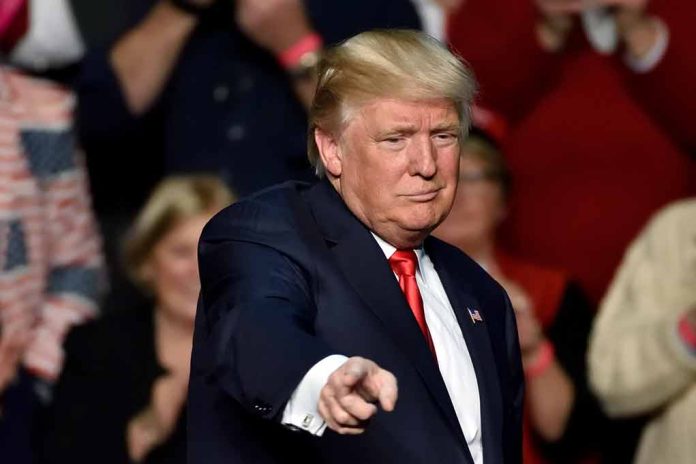
Former President Donald Trump fiercely defends his controversial tariff plan, clashing with Bloomberg editor John Micklethwait in a heated Chicago interview.
At a Glance
- Trump’s proposed tariffs could affect $3 trillion worth of imports
- Critics compare the plan to a national sales tax
- Trump argues tariffs will benefit the U.S. economy, despite economists’ warnings
- The plan includes at least a 10% tariff on European nations and potential trade halt with China
- Trump expressed desire for more influence over the Federal Reserve
Trump’s Economic Vision: Tariffs as a Growth Engine
In a rare confrontational interview at the Economic Club of Chicago, former President Donald Trump vigorously defended his proposed tariff policies against pointed questions from Bloomberg editor John Micklethwait. The exchange, occurring just three weeks before a crucial presidential election, highlighted Trump’s unwavering belief in tariffs as a tool for economic growth, despite widespread criticism from economists.
Trump’s plan, which could affect $3 trillion worth of imports, has been likened to a national sales tax by critics. However, the former president remained steadfast in his position, arguing that tariffs would have a positive impact on the American economy. This stance directly contradicts warnings from economists who caution that such measures could lead to higher consumer costs and exacerbate inflation.
During an interview with Bloomberg News and The Economic Club of Chicago, former President Donald Trump said he will protect U.S. companies with strong tariffs and lower taxes for the ones making their product in the U.S. pic.twitter.com/gYEuk0Ultv
— The National Desk (@TND) October 15, 2024
Tariffs and Trade Relations: A Bold but Risky Strategy
During the interview, Micklethwait pressed Trump on the potential consequences of his tariff strategy, particularly concerning international trade relations. The Bloomberg editor pointed out that Trump’s plan includes imposing at least a 10% tariff on European nations and could potentially halt trade with China, raising concerns about global economic stability and the U.S.’s relationships with key allies.
Trump’s vision for using tariffs extends beyond mere economic policy. He sees them as a tool to influence corporate behavior and counter China’s economic strategies. This approach, while appealing to his base, has raised eyebrows among international trade experts and diplomats who worry about the potential for escalating trade tensions and retaliatory measures from affected countries.
Federal Reserve and Economic Projections
In a revealing moment during the interview, Trump expressed a desire for more influence over the Federal Reserve, a stance that has raised concerns about the institution’s independence. This declaration aligns with his previous criticisms of the Fed’s policies and his belief that lower interest rates are crucial for economic growth.
When confronted with economic forecasts projecting increased U.S. debt under his proposed policies, Trump dismissed these projections, citing his previous economic record as evidence of his ability to manage the nation’s finances. This response highlights the ongoing debate about the long-term fiscal impacts of Trump’s economic vision.
Republican presidential candidate Donald Trump defended his plans to overhaul the US economy through dramatic tariff increases in a sit down with Bloomberg News Editor-in-Chief John Micklethwait at the Economic Club of Chicago https://t.co/DnHEUgjzx3
— Bloomberg Economics (@economics) October 16, 2024
Immigration and Local Economies
The interview also touched on the impact of immigration on local economies, a topic Trump has consistently emphasized in his policy discussions. He reiterated his stance on stricter immigration controls, arguing that such measures would benefit American workers and local communities.
This rare confrontational interview with Trump, who has recently favored engagements with conservative media outlets, provided a glimpse into the former president’s economic thinking as he eyes another run for the White House. With the economy being a paramount issue for voters, Trump’s defense of his controversial tariff plan and his broader economic vision is likely to remain a central topic of debate in the upcoming election cycle.
Sources:
- Trump Defends Tariff Plan While Pressing for More Fed Influence
- Trump clashes with Bloomberg editor over tariffs
- Trump’s Interview Remarks on Economic Policy, Fact-Checked
- Under fire, Trump contends economic policies won’t boost federal debt
- Trump Says His Favorite Word ‘Tariff’ Needs PR Help
- Trump’s ‘Beautiful’ Tariffs Foreshadow a Big Policy Experiment



